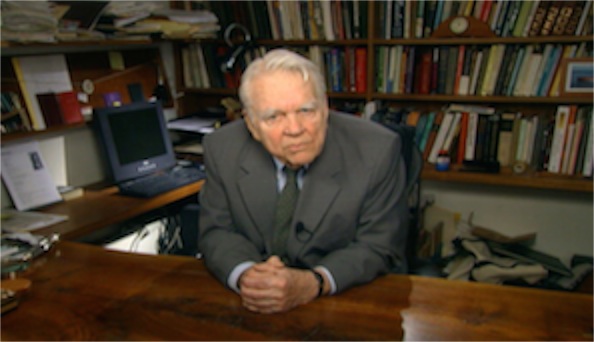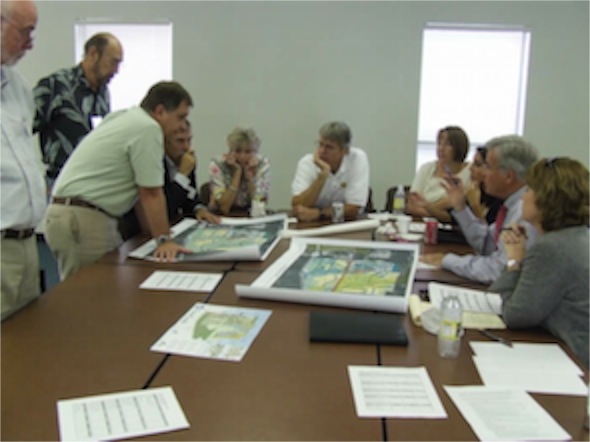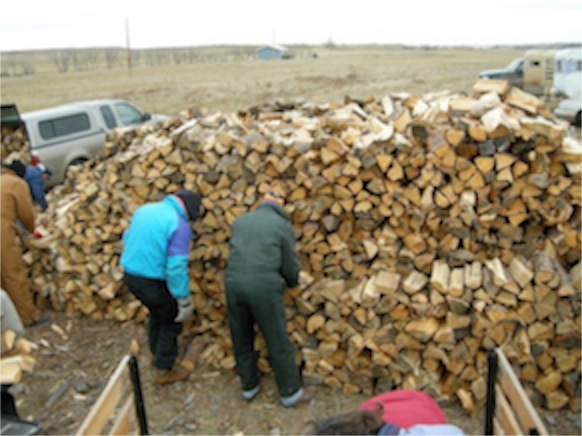Complainers and Contributors
26/07/12 04:04
I am not a big fan of television. I simply find other things to do with my time. But I do own a television and I have watched some programs. Most people my age can remember watching more than a few of the end-of-show segments on the CBS program 60 Minutes featuring Andy Rooney. Andy Rooney was a writer, who began working for CBS in the late 1940’s working first on the show, Arthur Godfrey’s Talent Scouts. Along the way, he became famous for his essays. During the 1960’s he collaborated with Harry Reasoner to produce essays that were developed into news specials. “An Essay on Bridges” appeared in 1965. “An Essay on Hotels” appeared in 1966. “An Essay on Women” was aired in 1967. And “The Strange Case of the English Language” appeared in 1968. He was awarded his first Emmy in 1968 for his role in writing the script for “Black History: Lost, Stolen, or Strayed.”
 What we remember, however, were those little three-minute or so essays that ended 60 Minutes. The topics were often inconsequential like the cost of groceries, the types of milk, brands of cars and sports mascots. The set was simple. We usually saw a head and shoulders shot of Rooney sitting behind a walnut table, which he built himself. He would read his essay and that would be the end of the program.
What we remember, however, were those little three-minute or so essays that ended 60 Minutes. The topics were often inconsequential like the cost of groceries, the types of milk, brands of cars and sports mascots. The set was simple. We usually saw a head and shoulders shot of Rooney sitting behind a walnut table, which he built himself. He would read his essay and that would be the end of the program.
It was immensely popular. CBS started airing the segments as an experiment in 1978 and continued until October of 2011. He died a month later. His television essays have been collected into several different books. “Common Nonsense” and “Years of Minutes” were published in 2002 and 2003. In all, he appeared on 60 Minutes for 33 years and provided 1,097 commentaries.
I think that I am a little bit like Rooney. I see myself as a writer. I write essays because the process of writing is helpful in sorting out my ideas. I don’t write them primarily for others to read, but I have ended up creating this blog to share them.
I’m a bit like him in other ways, as well. Part of what made Rooney so popular was that his “rants” were often lists of complaints. He’s start “Did you ever wonder why?” and follow up with a list of things that are silly, confusing, and sometimes destructive.
It seems that a complainer can always get an audience. There are always people who will listen to the complaints.
I think that the list of complaints grows as we age as well. We often associate grumpiness and complaining with old men. I’m not sure that Rooney became more of a complainer as he got older, but it seems that way. In that, I don’t want to imitate.
If it is true that complainers can always get an audience, it is also true that the deeds of doers often go without comment. Even when people do notice the work done by others, they often start to expect that work and fail to express gratitude or even give recognition for the work.
Anyone who has been part of an organization for a while can identify “complainers” and “doers.” The distinction is so clear that it sometimes seems like the “complainers” really do not want problems to be solved. They get their pleasure and their sense of meaning from identifying problems, not from solving them. Pastors and administrators of non-profit organizations all know the experience of listening patiently to the complaints of a member, suggesting solutions, only to have the person disappointed with the solutions and unwilling to follow up. I have begun to wonder if it might be simpler to begin by asking, “Do you just want to complain, or do you want to be part of the solution?” or “What level of commitment do you bring to this problem?” or “Would you be willing to spend as much time working on a solution as you do raising the problem?”
Of course, I would never really say those things. My job is to listen, to try to sympathize, and to offer pastoral care. I just don’t want to become know as a complainer. I’d rather pitch in and go to work on solutions when I recognize problems. If writing an essay every day deteriorates into a list of my complaints, then it will be time for me to stop writing.
Elridge Cleaver said in a speech in San Francisco in 1968, “You’re either part of the solution or part of the problem.” That quote has been revised, adapted and used by a lot of people since that time. So what does it mean to be a part of the solution?
 For me it means making a commitment. I invest my limited time and my limited financial resources in activities and causes that add value to my community. I chose to volunteer in organizations that are making a difference. I am trying to develop the skills of talking less and listening more. Increasingly, I am learning to avoid meetings. Despite the fact that my organization is dependent on meetings and organized around meetings, I have discovered that little actual work gets done in meetings. Too often the words said in meetings are repeated and lack meaning. Too often people invest plenty of energy in making plans, but little energy in accomplishing them. Goal statements, objectives, and other plans are not solutions to problems. They can be a way to organize work, but without the work, they are meaningless.
For me it means making a commitment. I invest my limited time and my limited financial resources in activities and causes that add value to my community. I chose to volunteer in organizations that are making a difference. I am trying to develop the skills of talking less and listening more. Increasingly, I am learning to avoid meetings. Despite the fact that my organization is dependent on meetings and organized around meetings, I have discovered that little actual work gets done in meetings. Too often the words said in meetings are repeated and lack meaning. Too often people invest plenty of energy in making plans, but little energy in accomplishing them. Goal statements, objectives, and other plans are not solutions to problems. They can be a way to organize work, but without the work, they are meaningless.
I love words. I love reading. I love talking. I love writing. I believe that great ideas deserve expression. Language is one of the tools of our culture that we ought to use. But language needs to be fresh. And sometimes actions speak louder than words. There is a time to speak and a time to keep silence. (Ecclesiastes 3:7, with the order changed) It is a tragedy to me when so many words are so badly wasted in complaining.
 I recently received a note reminding me of the necessity of planning for my retirement. I will most likely retire sometime in the next decade. I know that financial planning is necessary and I don’t want to be irresponsible. But more than that I hope that I can discover a way to retire as a contributor and not as a complainer.
I recently received a note reminding me of the necessity of planning for my retirement. I will most likely retire sometime in the next decade. I know that financial planning is necessary and I don’t want to be irresponsible. But more than that I hope that I can discover a way to retire as a contributor and not as a complainer.
Maybe my uncle had it right all along: “Quit your yapping and get to work!” It is advice I need to take.

It was immensely popular. CBS started airing the segments as an experiment in 1978 and continued until October of 2011. He died a month later. His television essays have been collected into several different books. “Common Nonsense” and “Years of Minutes” were published in 2002 and 2003. In all, he appeared on 60 Minutes for 33 years and provided 1,097 commentaries.
I think that I am a little bit like Rooney. I see myself as a writer. I write essays because the process of writing is helpful in sorting out my ideas. I don’t write them primarily for others to read, but I have ended up creating this blog to share them.
I’m a bit like him in other ways, as well. Part of what made Rooney so popular was that his “rants” were often lists of complaints. He’s start “Did you ever wonder why?” and follow up with a list of things that are silly, confusing, and sometimes destructive.
It seems that a complainer can always get an audience. There are always people who will listen to the complaints.
I think that the list of complaints grows as we age as well. We often associate grumpiness and complaining with old men. I’m not sure that Rooney became more of a complainer as he got older, but it seems that way. In that, I don’t want to imitate.
If it is true that complainers can always get an audience, it is also true that the deeds of doers often go without comment. Even when people do notice the work done by others, they often start to expect that work and fail to express gratitude or even give recognition for the work.
Anyone who has been part of an organization for a while can identify “complainers” and “doers.” The distinction is so clear that it sometimes seems like the “complainers” really do not want problems to be solved. They get their pleasure and their sense of meaning from identifying problems, not from solving them. Pastors and administrators of non-profit organizations all know the experience of listening patiently to the complaints of a member, suggesting solutions, only to have the person disappointed with the solutions and unwilling to follow up. I have begun to wonder if it might be simpler to begin by asking, “Do you just want to complain, or do you want to be part of the solution?” or “What level of commitment do you bring to this problem?” or “Would you be willing to spend as much time working on a solution as you do raising the problem?”
Of course, I would never really say those things. My job is to listen, to try to sympathize, and to offer pastoral care. I just don’t want to become know as a complainer. I’d rather pitch in and go to work on solutions when I recognize problems. If writing an essay every day deteriorates into a list of my complaints, then it will be time for me to stop writing.
Elridge Cleaver said in a speech in San Francisco in 1968, “You’re either part of the solution or part of the problem.” That quote has been revised, adapted and used by a lot of people since that time. So what does it mean to be a part of the solution?

I love words. I love reading. I love talking. I love writing. I believe that great ideas deserve expression. Language is one of the tools of our culture that we ought to use. But language needs to be fresh. And sometimes actions speak louder than words. There is a time to speak and a time to keep silence. (Ecclesiastes 3:7, with the order changed) It is a tragedy to me when so many words are so badly wasted in complaining.

Maybe my uncle had it right all along: “Quit your yapping and get to work!” It is advice I need to take.